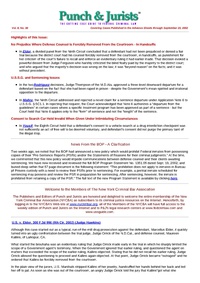After a jury in another state acquitted the defendant of, inter alia, conspiracy to possess and distribute about 1,221 pounds of marijuana, defendant was charged with conspiracy to possess with intent to distribute more than 1,000 kilograms of marijuana, and conspiracy to launder monetary instruments. Defendant moved to dismiss …
Here the Court held that the district court had incorrectly concluded that Medicare is a "financial
institution" for the purpose of imposing a four-level enhancement under U.S.S.G. § 2F1.1(b)(8)(B), after a plea of guilty to wire fraud.
The defendant in this case was charged with, and pled guilty …
This is an important Fourth Amendment decision in which a drug conviction was vacated on the grounds that the defendant’s consent to search his car, which was given at an illegal drug interdiction checkpoint, was not sufficiently an act of free will to be deemed voluntary since it was …
U.S. v. Rodriguez, 213 F.Supp.2d 1298 (M.D.Ala. July 30, 2002) (Judge Thompson) (Case 1)
U.S. v. Rodriguez, 214 F.Supp.2d 1239 (M.D.Ala. Aug. 08, 2002) (Judge Thompson) (Case 2)
Sometimes we cringe when the DOJ espouses the role as the exclusive arbiter of all that is fair and just in …
Here, based on Harris v. U.S., 122 S.Ct. 2406 (2002), the Supreme Court vacated its line of cases (including Flowal, Ramirez and Strayhorn) which had held that Apprendi applied to the imposition of mandatory minimum sentences.
The defendant in this case was sentenced defendant to 120 months following …
The defendant in this case was convicted of conspiracy to distribute cocaine base in violation of 21 U.S.C.S. § 846, and he was sentenced to 360 months in prison. Following the sentencing, defendant's counsel submitted a Criminal Justice Act (CJA) voucher, seeking fees and costs in the amount of …
Here the Court specifically approved in principle the use of a "multiplier" method of calculating drug quantities over a period of time, although it also held that under the facts of this case the method used by the district court was erroneous.
Here the Court held that, under …
Here the Court reversed as erroneous a 6-level downward departure that the district court granted on the ground that the defendants' money laundering activities were incidental to their failure to file currency transaction reports.
A jury acquitted defendants of one count of conspiracy to commit money laundering and …
This case addressed a novel argument concerning the scope and intent of the provisions of Application Note 6 (“Note 6") to U.S.S.G. § 5C1.1 (a provision entitled “Imposition of a Term of Imprisonment”). Note 6 states:
“There may be cases in which a departure from the guidelines by substitution …
U.S. v. Rodriguez, 213 F.Supp.2d 1298 (M.D.Ala. July 30, 2002) (Judge Thompson) (Case 1)
U.S. v. Rodriguez, 214 F.Supp.2d 1239 (M.D.Ala. Aug. 08, 2002) (Judge Thompson) (Case 2)
Sometimes we cringe when the DOJ espouses the role as the exclusive arbiter of all that is fair and just in …
The defendant/alien in this case was charged with criminal reentry into this country after deportation. He moved to dismiss his indictment on the collateral ground that ineptness of his attorney during his deportation proceedings resulted in violation of his right to due process, negating the predicate for the prosecution.
…
Here a divided panel from the Ninth Circuit concluded that a defendant had not been prejudiced or denied a fair trial because the district court had his counsel forcibly removed from the courtroom, in handcuffs, for conduct it deemed disruptive.
Although this case started out as a typical, …
